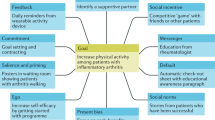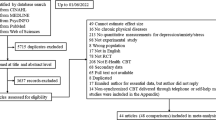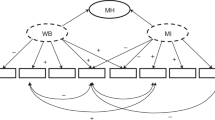Abstract
Patients with rheumatic disease must adjust psychosocially and behaviourally in order to manage the impact of symptoms and treatment on their daily lives, and the emotional consequences of the disease. However, patients can improve their well-being by taking a proactive role in self-management, for example by using coping strategies. Support for patient self-management from clinical teams usually comprises information and advice on disease management; however, this largely didactic approach often focuses on the biomedical aspects of rheumatic disease, without addressing how these aspects interact with psychosocial factors to influence health behaviours and thus outcomes. A cognitive–behavioural approach based on the biopsychosocial model of rheumatic disease can facilitate the identification of effective self-management strategies through collaboration between patients and clinicians. Most patients do not require intense cognitive–behavioural therapy from a clinical psychologist; rather, basic cognitive–behavioural techniques and tools could be used by rheumatology clinical teams to expand and enhance the support already offered to patients.
This is a preview of subscription content, access via your institution
Access options
Subscribe to this journal
Receive 12 print issues and online access
$209.00 per year
only $17.42 per issue
Buy this article
- Purchase on Springer Link
- Instant access to full article PDF
Prices may be subject to local taxes which are calculated during checkout

Similar content being viewed by others
References
Homer, D. Addressing psychological and social issues of rheumatoid arthritis within the consultation: a case report. Musculoskeletal Care 3, 54–59 (2005).
Evers A. W., Zautra, A. & Thieme, K. Stress and resilience in rheumatic diseases: a review and glimpse into the future. Nat. Rev. Rheumatol. 7, 409–415 (2011).
Nagyova, I., Stewart, R. E., Macejova, Z., van Dijk, J. P. & van den Heuvel, W. J. The impact of pain on psychological well-being in rheumatoid arthritis: the mediating effects of self-esteem and adjustment to disease. Patient Educ. Couns. 58, 55–62 (2005).
Zyrianova, Y., Kelly, B. D., Sheehan, J., McCarthy, C. & Dinan, T. G. The psychological impact of arthritis: The effects of illness perception and coping. Irish J. Med. Sci. 180, 203–210 (2011).
Groarke, A., Curtis, R., Coughlan, R. & Gsel, A. The role of perceived and actual disease status in adjustment to rheumatoid arthritis. Rheumatology (Oxford) 43, 1142–1149 (2004).
Gettings, L. Psychological well-being in rheumatoid arthritis: a review of the literature. Musculoskeletal Care 8, 99–106 (2010).
Keefe, F. J. et al. Recent advances and future directions in the biopsychosocial assessment and treatment of arthritis. J. Consult. Clin. Psych. 70, 640–655 (2002).
Hewlett, S. et al. Patients' perceptions of fatigue in rheumatoid arthritis: overwhelming, uncontrollable, ignored. Arthritis Rheum. 53, 697–702 (2005).
Nikolaus, S. Fatigue and factors related to fatigue in rheumatoid arthritis: a systematic review. Thesis, University of Twente (2012).
Hewlett, S. et al. Fatigue in rheumatoid arthritis: time for a conceptual model. Rheumatology (Oxford) 50, 1004–1006 (2011).
Sanderson, T. C. et al. The impact triad (severity, importance and self-management) as a method of enhancing the measurement of the personal life impact of rheumatic diseases. J. Rheumatol. 38, 191–194 (2011).
Emery, P. et al. Comparison of methotrexate monotherapy with a combination of methotrexate and etanercept in active, early, moderate to severe rheumatoid arthritis (COMET): a randomised, double-blind, parallel treatment trial. Lancet 372, 375–382 (2008).
Laas, K., Roine, R., Räsänen, P., Sintonen, H. & Leirisalo-Repo, M. Health-related quality of life in patients with common rheumatic diseases referred to a university clinic. Rheumatol. Int. 29, 267–273 (2009).
Lorig. K. R. & Holman, H. Self-management education: history, definition, outcomes, and mechanisms. Ann. Behav. Med. 26, 1–7 (2003).
Adams, K. & Corrigan, J. (eds) Institute of Medicine: Priority areas for national action: transforming health care quality (National Academies Press, Washington DC, 2003).
de Silva, D. Evidence: helping people help themselves. A review of the evidence considering whether it is worthwhile to support self-management (Health Foundation, London, 2011).
Von Korff, M., Glasgow, R. E. & Sharpe, M. Organising care for chronic illness. BMJ 325, 92–94 (2002).
Bodenheimer, T., MacGregor, K. & Stothart, N. Nurses as leaders in chronic care. BMJ 330, 612–613 (2005).
Rogers, A., Kennedy, A., Nelson, E. & Robinson, A. Uncovering the limits of patient-centeredness: implementing a self-management trial for chronic illness. Qual. Health Res. 15, 224–239 (2005).
Bandura, A. Health promotion by social cognitive means. Health Educ. Behav. 31, 143–164 (2004).
White, C. E. Cognitive behaviour therapy for chronic medical problems: a guide to assessment and treatment in practice (Wiley, Chichester, 2001).
Dures, E. et al. “They didn't tell us, they made us work it out ourselves”: patient perspectives of a cognitive–behavioural programme for rheumatoid arthritis fatigue. Arthritis Care Res. (Hoboken) 64, 494–501 (2011).
Dissanayke, R. K. & Bertouch, J. V. Psychosocial interventions as adjunct therapy for patients with rheumatoid arthritis: asystematic review. Int. J. Rheum. Dis. 13, 324–334 (2010).
Leon, L. et al. Effectiveness of an early cognitive–behavioral treatment in patients with work disability due to musculoskeletal disorders. Arthritis Rheum. 61, 996–1003 (2009).
Sharpe, L. et al. A blind, randomized, controlled trial of cognitive–behavioural intervention for patients with recent onset rheumatoid arthritis: preventing psychological and physical morbidity. Pain 89, 275–283 (2001).
Sharpe, L., Allard, S. & Sensky, T. Five-year followup of a cognitive behavioral intervention for patients with recently-diagnosed rheumatoid arthritis: effects on health care utilization. Arthritis Rheum. 59, 311–316 (2008).
Evers, A. W., Kraaimaat, F. W., van Riel, P. L. & de Jong, A. J. Tailored cognitive–behavioral therapy in early rheumatoid arthritis for patients at risk: a randomized controlled trial. Pain 100, 141–153 (2002).
Hewlett, S. et al. Self-management of fatigue in rheumatoid arthritis: a randomised controlled trial of group cognitive–behavioural therapy. Ann. Rheum. Dis. 70, 1060–1067 (2011).
Van Koulil, S. et al. Tailored cognitive–behavioural therapy and exercise training improves the physical fitness of patients with fibromyalgia. Ann. Rheum. Dis. 70, 2131–2133 (2011).
Hurley, M. V., Walsh, N. E., Mitchell, H., Nicholas, J. & Patel, A. Long-term outcomes and costs of an integrated rehabilitation program for chronic knee pain: a pragmatic, cluster randomized, controlled trial. Arthritis Care Res. (Hoboken) 64, 238–247 (2012).
Otonello, M. Cognitive–behavioural interventions in rheumatic disease. G. Ital. Med. Lav. Ergon. 29, A19–A23 (2007).
Astin, J. A., Beckner, W., Soeken, K., Hochberg, M. C. & Berman, B. Psychological interventions for rheumatoid arthritis: a meta-analysis of randomized controlled trials. Arthritis Rheum. 47, 291–302 (2002).
Williams, D. A. Psychological and behavioural therapies in fibromyalgia and related symptoms. Best Pract. Res. Clin. Rheumatol. 17, 649–665 (2003).
Keefe, F. J. & Somers, T. J. Psychological approaches to understanding and treating arthritis pain. Nat. Rev. Rheumatol. 6, 210–216 (2010).
Sharpe, L., Sensky, T., Timberlake N., Allard, S. & Brewin, C. R. The role of cognitive–behavioural therapy in facilitating adaptation to illness in rheumatoid arthritis: a case series. Behav. Cogn. Psychother. 29, 303–309 (2001).
Hammond, A., Bryan, J. & Hardy, A. Effects of a modular behavioural arthritis education programme: a pragmatic parallel-group randomized controlled trial. Rheumatology (Oxford) 47, 1712–1718 (2008).
Dures, E. et al. Why do we need to pilot interventions? Essential refinements identified during pilots of a fatigue intervention [abstract #308]. Rheumatology (Oxford) 51 (Suppl. 3), iii167–iii168 (2012).
Sage, N., Sowden, M., Chorlton, L. & Edeleanu, A. CBT for chronic illness and palliative care: a workbook and toolkit (John Wiley & Sons, Chichester, 2008).
Turk, D. C., Swanson K. S. & Tunks, E. R. Psychological approaches in the treatment of chronic pain patients—when pills, scalpels, and needles are not enough. Can. J. Psychiatry 53, 213–223 (2008).
Pitt, V. J., O'Connor, D. & Green, S. Referral of people with osteoarthritis to self-management programmes: barriers and enablers identified by general practitioners. Disabil. Rehabil. 30, 1938–1946 (2010).
Hibbard, J. H., Collins, P. A., Mahoney, E. & Baker, L. H. The development and testing of a measure assessing clinician belief about patient self-management. Health Expect. 13, 65–72 (2010).
Hammond, A. & Klompenhouwer, P. Getting evidence into practice: implementing a behavioural joint protection education programme for people with RA. Br. J. Occup. Ther. 68, 25–33 (2005).
Iversen, M. D., Hammond, A. & Betteridge, N. Self-management of rheumatic diseases: state of the art and future perspectives. Ann. Rheum. Dis. 69, 955–963 (2010).
Zautra, A. J. et al. Comparison of cognitive behavioural and mindfulness meditation interventions on adaptation to rheumatoid arthritis for patients with and without history of recurrent depression. J. Consult. Clin. Psychol. 76, 408–421 (2008).
Lorig, K. R., Ritter, P. L., Laurent, D. D. & Plant, K. The internet-based arthritis self-management program: a one-year randomized trial for patients with arthritis or fibromyalgia. Arthritis Rheum. 59, 1009–1017 (2008).
Author information
Authors and Affiliations
Contributions
Both authors researched the data for the article, provided a substantial contribution to discussions of the content, and contributed equally to writing the article and to review and/or editing of the manuscript before submission.
Ethics declarations
Competing interests
The authors declare no competing financial interests.
Rights and permissions
About this article
Cite this article
Dures, E., Hewlett, S. Cognitive–behavioural approaches to self-management in rheumatic disease. Nat Rev Rheumatol 8, 553–559 (2012). https://doi.org/10.1038/nrrheum.2012.108
Published:
Issue Date:
DOI: https://doi.org/10.1038/nrrheum.2012.108
This article is cited by
-
Newly diagnosed with inflammatory arthritis (NISMA)–development of a complex self-management intervention
BMC Health Services Research (2023)
-
Changing health behaviours in rheumatology: an introduction to behavioural economics
Nature Reviews Rheumatology (2020)
-
What support is needed to self-manage a rheumatic disorder: a qualitative study
BMC Musculoskeletal Disorders (2017)
-
A qualitative study of patients’ perspectives on collaboration to support self-management in routine rheumatology consultations
BMC Musculoskeletal Disorders (2016)
-
Affective disturbance in rheumatoid arthritis: psychological and disease-related pathways
Nature Reviews Rheumatology (2016)



